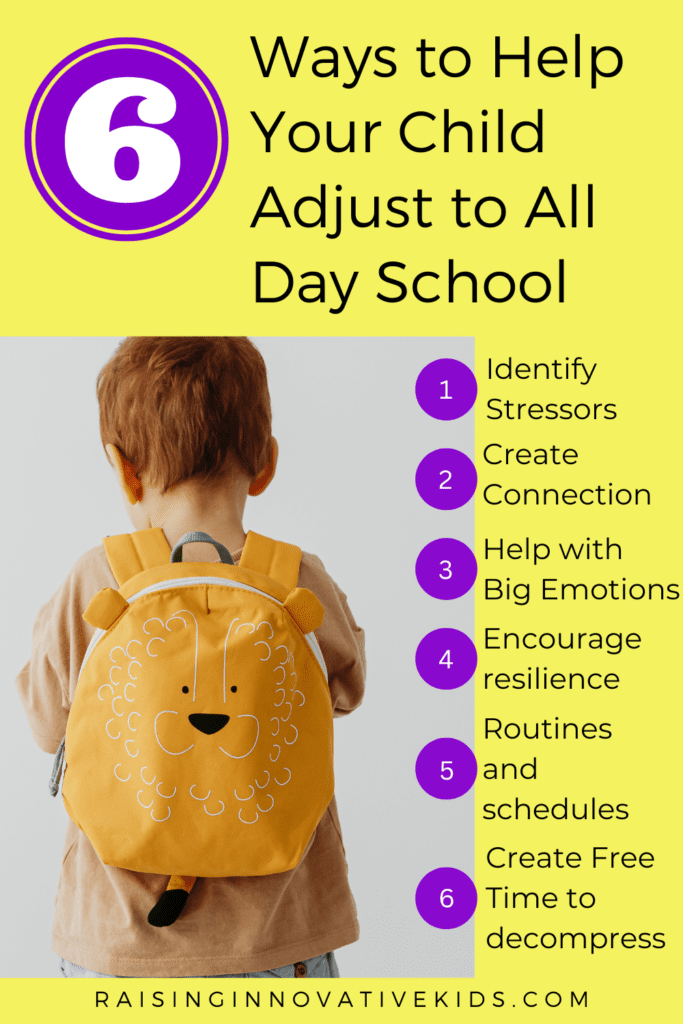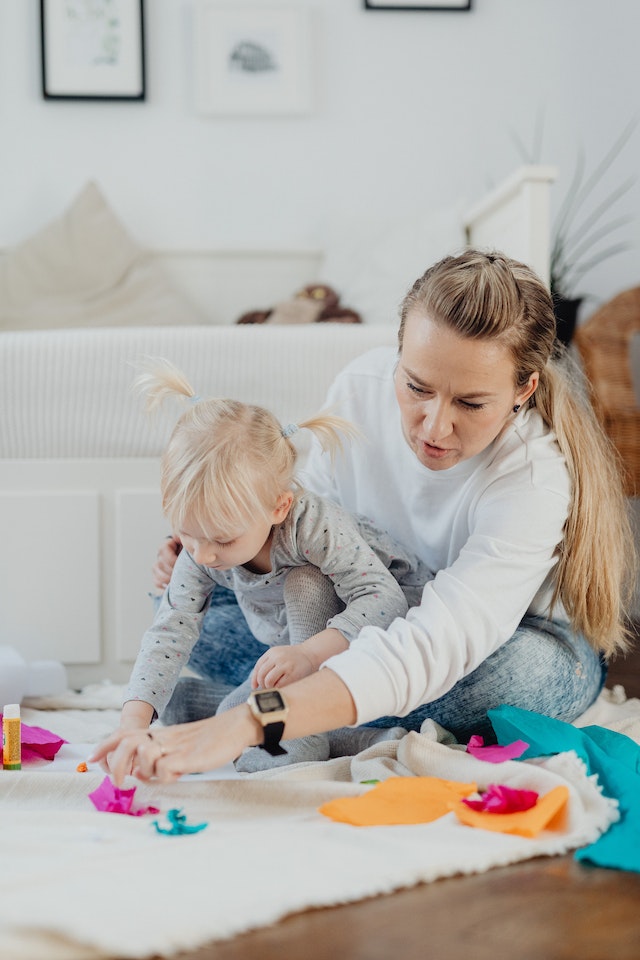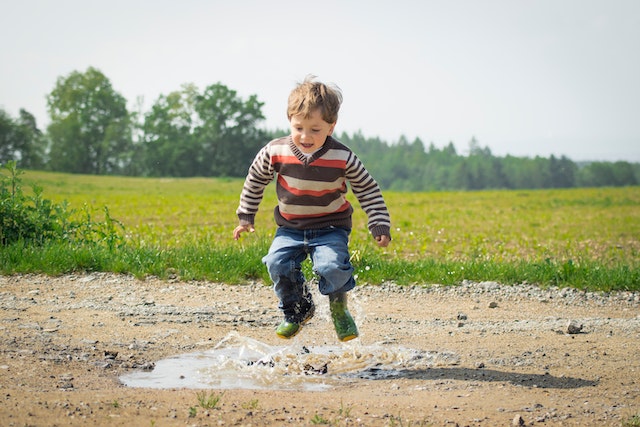6 Ways to Help Your Child Adjust to All Day School
School just started and my first grader was having a hard time adjusting to going to school all day. Our new after-school routine has really helped him understand expectations at home which has helped him unwind and relax, but our schedules are still pretty tight.
After school activities, homework, dinner, reading, and the extra community stuff we do keeps us pretty busy and my kid was feeling the stress of the go-go-go. His teacher talked to me about some behavioral issues he was facing at school and I realized something needed to change. This is a post about what I did to help him through it.

In this article we will cover the following:
Identify Stressors in Your Child’s Life
When the teacher pulled me aside to note my son’s behavioural concerns, she asked “Is there anything going on in your life that could be causing him to stress?”
At first, I said no and was taken aback by her question. But then I started asking myself some other questions.
- How has his behavior been at home?
- Has there been anything he has been exposed to that would cause him stress?
- Is there something going on that I haven’t noticed or could be causing him to be overwhelmed?
- Has he been eating well? Has he been following a healthy sleep routine?
- How are his other routines?
I noticed there were a few stressors going on with my son that alone didn’t raise concern. However, together they added up to a pretty decent amount of stress.
- We just found out he needed a surgery and it was coming up in the next month
- Soccer just started
- All day school just started
- Kids at school were a bit more agressive than the daycare he had been used to
- He just quit going to daycare that he has been to for over 5 years
With all of these things combined, I realized he probably needed some help learning how to manage and explore these emotions. The biggest one was the adjustment to all day school. This meant that even though I had spent quite a bit of time connecting with him and talking to him, he needed just a little bit more of me today.
Create Connection Moments With Your Child

My initial desire to handle this situation was to lecture my child. However, as I reflected on what my child truly needed, I knew in my gut it wasn’t a lecture. I asked myself, “how can I get him talking to help me understand what is going on?”
Through this reflection, I realized he needed to have some outdoor fun. He needed to physically move some of that energy out of his body. We opted for outdoor therapy by riding bikes. We laughed and connected in the best of ways.
The change to all-day school meant that a lot of the time we used to spend together was gone. This meant I needed to be more intentional about the time we did have together and prioritize it better.
What you can do to connect with your child
If you need to connect with your child and get them talking, try doing something fun! It really does work wonders. Here are some ideas.
- Bike rides and walks outside
- Play at the park
- Turn on some music and dance
- Be silly and play pretend monsters or horses
- Tickle your child and let them tickle you
- Run and race with each other
- Get out the legos and build something together
- Cook something together
- Make cookies or some sort of treat to eat together
- Go out for ice cream
- Go to the pool or trampoline park
I prefer physical activities because it can literally move the negative energy out of their system. Kids sit for long periods of time at school. Prioritizing exercise after school can be a great way to offset the amount of time they are sitting.
I also really like to do activities like Legos or drawing with my child in times like this. These types of activities are things we can do side by side and get my child talking naturally. Forcing anyone to open up just doesn’t work.
Read 3 Ways To Create a Home Environment For Innovative Kids
Help With Big Emotions

One of the biggest struggles parents have told me regarding all-day school is helping our children manage their emotions. We all lose our tempers or cry. It’s important not to expect our children to be perfect at managing their emotions. Especially when we, as adults, often struggle with the same thing. Instead, it’s good to remind them that they are allowed to have those emotions. That the big emotions are hard, but they are strong and can get through them.
How to help our kids manage their emotions
Building emotionally resilient kids means that we allow our children to explore their emotions. We also teach them healthy ways of processing them. As our kids start to open up and share about the hard things about their day, we should actively listen. We don’t have to solve their problems. Instead, we can coach them and listen to them as they open their hearts to us.
My child and I went on a 45-minute bike ride. Then we went to the pool. After that we had family dinner and story time. It wasn’t until late that night when I laid down to cuddle him that he started opening up about the things at school.
Be patient with your child as they explore and find the words to express themselves.
I gave very little advice to my son. However, my expectations were clear at the end of the conversation. I expressed my desire and expectation for him to keep his hands to himself (aka not hit or push). I told him why it’s important to me. Other than that, I let him explore and identify solutions to the problems he was facing.
Encourage Your Child to be Resilient

With just a little bit of outdoor therapy, heartwarming connection, and a safe and comforatble environment, my son was able to express his emotions and work through his problems. We are told often in our society that we have to learn the skills to become resilient. I think we often forget that 99% of the time, we were born with the skills we need. We just have to reconnect with them.
Our kids are no different and they have the ability to get through anything life throws at them. Our job as parents is to have a relationship and connection with them so that we can coach them through these things and help them learn how to do it all independently. Strong relationships with our kids will allow us to have a strong influence over them. In this way, we can help them when the path gets hard.
Create Routines and Schedules That Can Help Your Child Thrive

Being overscheduled and stressed isn’t the best for our kids, but when our schedules are managed well and we have consistent routines, our kids thrive. The best way to help our children adjust to all day school is to have good, healthy routines. A routine is simply a stack of habits that follow each other. Some of the routines we have in our house are as follows:
- Clearing your place after you eat
- Brushing your teeth after you change into (or out of) pajamas
- Going through backpacks when we first get home
- Reading before bed
Routines Help Our Kids Self-Esteem
It really doesn’t matter what your routines are as long as they are positive and working for your family. Having traditions and routines helps increase self-esteem and the security your child feels at home with you and gives them a greater sense of belonging. It also makes some things easier when your child knows automatically when to do something.
Building daily routines that work for you and your children will help when life is really hard. Everyone can fall into autopilot and things still get done. Setting aside 15 minutes a day to connect with your child (reading stories or playing games) will help your child adjust to all-day school.
Schedule Free Time to Help Your Child Decompress

After a long day at school, our kids can be exhausted. Take the time to set aside a small amount of time (even just 10 minutes), to let your kid unwind. This can do wonders for them as they learn to navigate the new routines and adjust to the new normal of all day school.
Here are some tips that can help make this happen.
- Give your kids the option of how they want to spend their time for the next 15 minutes
- Screen time may be the most frequent answer, but it isn’t the most fulfilling. Allow it sometimes if it makes sense for you, but try to encourage other options first.
- Give your kids choices of the options you want them to engage in that will help them unwind.
- Have some time in where you sit with them for 10 to 15 minutes (you don’t have to talk, just be together)
- Ask your child to lay in their bed for 15 minutes to get some rest
There are lots of ways to help your child unwind. Often, what they think they want (candy, TV, or video games), isn’t what will help them most. Again, it’s okay to have these things sometimes if it makes sense. But TV and candy can sometimes increase the cumulative stress your child is experiencing rather than erase it.
Conclusion
All day school can be rough for our kids, but it can also be really good for them. Learning how to go to school all day, adjust to the classroom setting, and get along with the other students are all things kids can do as they mature and grow up.
Admittidely, I was worried at first with my sons behavioral issues that school wasn’t going to be good for him. However, by implementing some of the simple changes (a better routine, more down time, and increasing connection time), it seems like those issues are slowly disappearing.
Good things take time, so give yourself grace as you implement these new routines. You can make anything work as long as you are paying attention to the needs of you and your children. I hope all of these tips help you as your child adjusts to all day school.
The last thing you need to know about your child adjusting to all day school
Don’t give up. Keep trying new things and stick with the new change for at least 2 to 3 weeks to see if it makes a difference. Change is hard for anybody, but our kids are resilient and will learn to adapt as we give them the tools to do so.
For ideas on what to do after school, check out these articles!
21 Best Tips to Limit Screen Time
14 Simple Steps to Building Your After-School Routine
Enjoyed this? Subscribe to my email list!







![How to teach your young kids about money [simple ways to start]](https://raisinginnovativekids.com/wp-content/uploads/2022/09/b_xf7m1ftha-768x514.jpg)